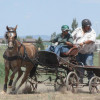How Long is Too long?
I am in the middle of drafting a hub but am finding it to be getting quite long with a lot I still want to include. Is there a recommended (or actual) maximum length that a hub can be and is there a precedent for dividing into multiple linked parts?
Many thanks,
RobIf you're new to HP, I would recommend articles between 3K to 5K. Then as you develop followers, increase from there. That's what I've tried to do. Don't be afraid to edit.
You're writing in a very particular niche which appeals to enthusiasts, which means they are probably willing to read longer Hubs. For most other writers, 3k to 5k is far too long for a single Hub.
The general advice (not just on HubPages) is that most readers will only scroll down for about 1,500 words, then their eyes will glaze over! So I'd set that as the limit.
Instead of just splitting your Hub at that length, though, I recommend writing the whole thing on Word, then taking a hard look at it and ask yourself - is this really all about one thing? Am I covering two, three or even four different aspects of this subject?
It's quite rare to be able to write 3,000 or 4,000 words on one single thing (unless you're rambling, which I'm sure you're not!). Usually, you'll find you've covered several different aspects of the subject, which will present more clearly if you separate them. You may even find you can make four or five short Hubs, each covering a different strand - which will make things much more understandable for your readers.
Five interlinked 600-word Hubs can be more successful than two 1,500 word Hubs, because you get the chance to create more titles and more URL's for Google to find. Make sure you link them all to each other (maybe a right-aligned links Hub in each one, listing the others in the series). Just remember - don't use Part I, Part II. Give each one a distinct title describing exactly what it's about.Marisa Wright informed me several days ago about how Google dislikes "pt. 1," "pt. 2," (and etc.) for titles, in a question I had asked about SEO (Search Engine Optimization). I am glad that you started this forum post, as I am interested to learn more about this issue:
For instance, the LC (Learning Center) recommends "minimums" for Hubs. Also, successful Hubbers such as Writer Fox recommend longer Hubs in order to appeal to Google more.
http://hubpages.com/learningcenter/Elem … tellar-Hub
There seems to be some debate as to "maximums," though.
The LC also suggests that longer Hubs tend to exhaust readers, and that series Hubs may be a solution. Moreover, other Hubbers recommend a TOC (Table of Contents) as a possible alternative:
http://sidkemp.hubpages.com/hub/TOC
I would be interested to know if a (theoretically) successful longer Hub could do better with a TOC, or broken up into a series.I tend to write wordy hubs, and have many that are 3,000 words. I have split them into parts, and they are my most popular hubs. I did 7 of them on the Motherpeace Tarot deck, a rare, Feminist deck from the 1970's, and at first people told me that nobody would read them. They have been my top hubs for about two years now.
There was a natural point to "split" them though, because they have four suits and Major cards. If someone was trying to learn to read that Tarot Deck, it would be helpful.
I did the same when I got interested in Greek Myth. I decided to look at the characters as archetypes, and although the hubs are long, they are top earners too. It's all about who is interested in your topics. With the Tarot Deck, a person could read and learn each suit at a different time. In the Greek Myth, each god or goddess is different. Don't be afraid of long hubs, Google loves them.I just wanted to add that I think very highly of Marisa and her advice. She is very knowledgeable, and has helped me a lot with online writing!
Jean, as a new hubber, it helped me to know that you can write wordy hubs! I am a naturally wordy writer and it is a challenge for me to cut it down! I feel better now to know I can keep my style and still achieve success. It is very hard to be something you're not, in life and writing!!!!
It is an interesting debate here, but how about "always" keeping the reader in mind. There is also the matter of style: some can write effectively in few words, others need the galaxy of words to express any idea. But again if a writer wants people to read what he/she is writing then "readers perspective" should be supreme.
However, if the purpose is to express oneself through writing then readers and search engines don't matter. The reward here will be certainly therapeutic!!
You're right, there is a lot of debate on the topic of length! That's because there are two opposing needs: the need of your real audience, and Google.
Readers are usually looking for a specific answer rather than general coverage of a topic, so you'll satisfy them more if you write a series of shorter Hubs (say 400-600 words), each covering a very specific aspect of the topic. That way they don't have to wade through the irrelevant stuff to get to the bit they want.
In contrast, long Hubs are more likely to please Google because the longer the Hub, the more keywords there will be.
Sunforged (a successful internet entrepreneur who used to be a prominent Hubber) used to say that you can have the best of both worlds: write the shorter Hubs and interlink them all (e.g. with a right-aligned coloured text box on each, listing the other Hubs in the series).That's a good idea, Marisa, but will it work? I've been editing hubs recently, and several times, have been 'notified' by the new "style guide" that I have "several links in one place." Ergo, HP seems to now prefer that you do not put a capsule full of links like this...

Possibly, but so long as it's not actually "illegal", does that really matter?
Depending on the topic, if you think about it carefully, there is probably a natural point where it will seem right to stop. I agree, you can't call them Part 1, Part 2, Part 3, or you would bore everyone to death.
You have a main topic, like an umbrella, and the pieces of it are related. So think of a title that shows it's related. I've done a few that have Part 2's, but they are on my blog and Part 1 is here. That was in an effort to get people to my blog, which was semi successful. I think links are OK, but the rules are very strict as to whether they definitely are related to the main topic. You can't stray far.
Not everyone agrees with that theory. I can think of at least one top writer who maintains that writing a series of shorter Hubs on the same topic, all interlinked, can rank just as well (or possibly better) than one huge Hub. Have you every tried that option?
Shorter hubs rank well when they have relevant internal as well as inbound links. Google needs to know that you have provided more resources for your reader.
With same number of links, a 3k article will rank better than say 1.5k hub, but if the shorter hub is more popular, than it will outrank the longer one.
Keep the patience of your readers in mind. Let the title decide how much should be included to maintain focus on the topic. I am skeptical if readers want to go beyond 3K, except in exceptional cases.
Goodpal is right; keep the audience is mind. Wikipedia articles are long but people can always find they what they are looking for. They don't have to read the entire thing.
I am writing a hub right now. It's past 3k, but also has 50+ images, and divided into 50 subtopics.
After rewriting 700-1200 word hubs to 2300-2800 words has given me good traffic. But rather than adding extra facts, data or statistics I increased the depth of analysis so that the focus stays on the title. Another good way to make hubs better is to use the right side bar effectively - by highlighting important information and adding images with something written on them. The only thing I keep in mind is not to stray away from the title.
My personal feeling is that 2500 words is a good upper limit as a general rule.More than anything else, your competition for keyword ranking determines how long your Hub should be. For example, if you want your Hub to rank #1 for "Barak Obama", you better be prepared to write a Hub of more than 23,000 words, a 36 item Table of Contents, and massive internal links to other resources to outrank the Wikipedia article. However, if you want to rank your Hub for "pointe shoes online", about 500 words and some great outbound internal links should do the trick.
Only an amateur web content writer would attempt to write Hubs as Part 1, 2, 3, etc., using basically the same title. The person who suggested doing this on HubPages is talking about days long ago and the Google algorithms have significantly changed since those times.
You should remember that Google is looking for the best answer to a search query and that often means the most comprehensive answer. The Web becomes a more competitive venue every day and if you want good results from Google traffic, look at the webpages ranking at the top for search queries and write a better page.
Hi Rob,
There is no limit to the length of a hub. I myself have quite a few over 2,000 words and I have heard people who do very well with hubs longer than that.
I also faced your dilemma a few times and I always split them into two. I understand from what other have advised that calling them Part One and Part two is not Google friendly. I now treat them as two related hubs on the same topic, rather than two parts of the same thing.Many thanks, I think I will divide it into two and see how it goes.
RobI have read about Hubbers who wrote with 5,000+ words (maybe to 9,000, I am not sure) and fictional Hubs which have forty-seven chapters (Hubs) and I think are still going.
I would be interested in hearing more about Google and Part 1, Part 2, etc., if anyone knows about that. I have a Part 2 hub that gets less than half the traffic of the first hub (which is not titled part one).
Hubpages doesn't recommend dividing into parts and I am sure they have a good reason.
Is that right? Where is that stated?
I agree it's not recommended to use the same title with Part 1, Part 2 - that's because duplicate titles are disliked by Google. However, I'd have thought it's much better to have two Hubs of 1,500 words than one Hub of 3,000 wordsMarisa, That is what I meant, not using Part 1, 2 etc. If you read the comment above what I answered, that is what they were asking - should they use Part 1, 2 etc.
As far as I understand, Google downgrades part 2 hubs because typical searchers aren't looking for part 2 (or 3 etc.) of anything, they're looking for sites that best answer their query. If they find that your site or hub provides the info that they need but is in multiple parts, that's fine, but they want to start with part 1. They don't want to go to part 2 and have to navigate to part 1.
If they want to read part 2 after part 1, then they'll go there from part 1; they won't use a search engine. So Google sees part 2 as a bit redundant for search purposes and potentially annoying for its customers.
I got rid of all my part 2 & 3s etc. by renaming them, and it seems to have been a good move.
I just created a Hub of about 8500 words in length, splitting it would make it seem incompleat or confusing for readers. I don't think there is a maxium length, Hubpages and Google always talk about content, more is always better than less!
It's a tough call. As others have said, "the Big G" tends to penalize "parts," so that splitting it is not a great idea.
I have a few hubs that are not "Parts" of the same exact issue, but "parts" of a general topic trend. They don't do well. I'm going to have to find the time to re-title them and do some editing.
The problem with lengthy hubs, or any article of length, is that people these days are lazy, lazy readers. If they can't find what they want in the 140 characters of a Twitter post, or a status update on Face Book, they won't stay with it.
I run into that with my own husband, who, if I'm reading something to him that is more than about 5 paragraphs, he'll start to roll his eyes, interrupt, and say, "How long IS this, anyway?"
I know I have trouble with brevity, because I learned a bad habit in school, of how to 'stuff' an essay with extra words and explanations to expand to the required word count.
Now, I have to learn to be concise, and leave out the "back story" or excessive explanations and editorializing.
In the end, it's a personal choice of how much you think the material needs to stay together in order to make sense....and you see what I mean about my problems with keeping it simple.

I would suggest 1k is max, after that readers loose interest. Divide your thoughts into multiple hubs strategy.
You would never expect to read a reference book and have it solid from one end to another without it being broken down into sections and chapters; each organized around a specific facet of what you are writing about.
I can't think of much that would require 1000s of words to explain that would not need splitting into several chapters which could be separate interlinked hubs.
Personally I break my hubs into around 1000 - 1500 words, and many are split over several hubs to fully explain a subject. With links in the text and the group facility as well.
If your hub is VERY long I would break it down as you are likely to get more visitors from google for each part... But DON"T just have SUBJECT part 1, SUBJECT part 2, SUBJECT part 3..
Be descriptive in your Titles, use the 5Ws and 1H and add something if you can also..
Why you need to Subject
Who should Subject
When..
What is..
Where to..
How to..
add things like;
..at christmas
..with the kids
..on a budgetI agree with LeanMan: there should be sections to break into, or chapters. I am working on a project now, that I have been working on for about - well, never mind. We'll just call it "a while" now. My problem has always been how to break it down. Hub Pages is really helping me with this, a LOT! I can look at what I have written, organize it and see where natural breaks are and where an entirely new topic should begin.
You might try starting the hub, and when you think too much is in there, start a new - related - hub. Put some of your overflowing information into that and see what kind of a new section happens.
Good luck!Also, Robjlodge, if you can include a table of contents with internal links to capsules, this will aid the reader if he or she wants to jump to a specific section without having to scroll all the way down. This technique is a little tricky, though (I'm still learning it), but there are hubs on it and you can find the topic "Table of Contents" through Hub Pages search.
amiebutchko,
Most people agree that when somebody is searching for something online, they want a quick answer. And that is true. But as more magazines and newspapers are going online and not making hard copies anymore, people who want to know a lot more about a topic are looking for it online too. So they may have no place else to go unless they want to buy a book on the subject.
I had a lot of criticism about the Motherpeace tarot and Greek myth pieces, but they have been my top hubs for 2 years now. I've been scattering my attention writing in too many places. I have been on Bubblews, and like that the money is fast. But some of the writing makes me ashamed to be on there, and you get notifications about hundreds of people who read your writing. There's no way you can write to all of them, and I wouldn't put that effort in for $25.00 payouts anyway. But I don't want to add more here, when they change rules it's murder to change 130 hubs. I do miss "real" writing though. I've been giving Infobarrel a try again, I never caught on with the crowd on Wizzley for some reason. The nature of online writing is constantly changing.
Related Discussions
- 21
can you have too long of a hub?
by Daniele M Robbers 7 years ago
what factors help you decide if a hub is too long? I know different styles of hubs based on topics and what not help determine how long it is going to be. I worry about what is to many words though.
- 26
Is 2500 Words Too Long for a Hub?
by Dean Walsh 12 years ago
I'm working on a hub providing a beginners guide to programming languages and its getting quite long - I'm definitely going to hit 2000 words with it and will probably go up to 2500 unless I really make an effort to keep the length down.Is that too long? It seems quite a lot for a single page to me...
- 21
Took a month to interview the right people and write. It's too long...
by TessSchlesinger 9 years ago
I don't think its too long, or especially long at all. Anyone who wants to know about getting around Cape Town is going to want lots of info. The more you can provide the better. I think you did a good job. Not sure what HP will think of your links. They seem useful in context, but some of them are...
- 20
Is my hub too long?
by Janet21 16 years ago
My latest hub is almost 1400 words. Is that too long? Is it difficult to read? Let me know what you think. Thanks!http://hubpages.com/hub/Thomas-the-Tank … er-Railway
- 21
When is a Hub considered too long?
by Mary Hyatt 13 years ago
I want to write a traveloge covering six days. It will be quite lenghthy; maybe 5,000 words. Should I write one Hub or break it up into several Hubs? I'd rather not break it up. I plan to use lots of photos of places I visited.Thanks.
- 9
When is a Hub too long?
by bloggernotjogger 14 years ago
Just wondering cause my hubs seems to be getting longer.I´m working on one that could potentially become quite extensive. The question is whether I should divide it into two or three parts. Also, do hubs lose their interest if it is divided into too many parts?

























